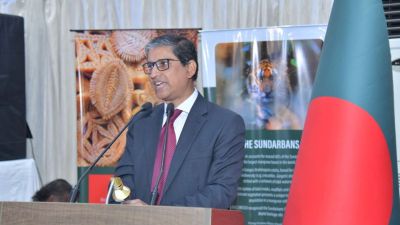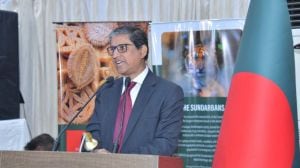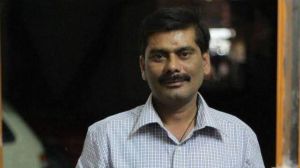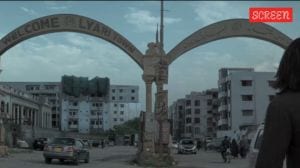
(a) According to the Finance Commission (Miscellaneous Provisions) Act, 1951, “the Commission” means the Finance Commission constituted by the President pursuant to clause (1) of article 280 of the Constitution.
(b) Every member of the Commission shall hold office for such period as may be specified in the order of the President appointing him and shall not be eligible for reappointment:
(c) The recommendations of the 15th FC cover the six-year period up to 31st March 2026.
(d) Dr. Arvind Panagariya is the Chairman of the 16th Finance Commission of India.
QUESTION 2
Consider the following statements with reference to Lok Sabha elections in India?
1. From 1951 to 2019, India has held 17 Lok Sabha elections.
Story continues below this ad
2. Both the size of the electorate and voter turnout has increased from the 1951 election till date.
3. The 2014 election was historic as it was the first time since 1951 that a party achieved an absolute majority.
How many of the statements given above is/are correct?
(a) Only one out of three statements
(b) Only two out of three statements
(c) All of the three statements
(d) None of the statements
QUESTION 3
The judgement of the Supreme Court in this case is considered a landmark one when the Supreme Court ruled that the President – who until then had the sole power to impose the President’s Rule – had to take consent from both Houses of Parliament from then on, and that the decisions were subject to judicial review.
Story continues below this ad
Which is the case being referred in the above given lines?
(a) Shayara Bano vs Union of India & Others
(b) Ka Najeeb V Union Of India
(c) IR Coelho case
(d) SR Bommai v Union of India
QUESTION 4
Consider the following statements:
1. Articles 371-B and C allow the creation of special committees in the Legislative Assemblies of Assam and Manipur. 2. Sixth Schedule contains provisions regarding the administration of tribal areas in the states of Assam, Meghalaya, Tripura and Nagaland.
3. Article 371-F provides special provisions for Sikkim to protect the rights and interests of the different sections of the population
How many of the statements given above is/are not correct?
(a) Only 1
(b) Only 2
(c) All three
(d) None
QUESTION 5
Consider the following statements:
Story continues below this ad
1. Article 364 of the Indian Constitution deals with immunity to the President and the Governors.
2. No criminal proceedings whatsoever shall be initiated or continued against the President, or the Governor of a State, in any court during the term of his office.
3. No process for the arrest or imprisonment of the President, or the Governor of a State, shall issue from any court during his term of office.
How many of the statements given above is/are correct?
(a) Only 1
(b) Only 2
(c) All three
(d) None
ANSWERS TO THE MCQs
1. (b)
FYI:
Story continues below this ad
“Term of office of members and eligibility for reappointment. Every member of the Commission shall hold office for such a period as may be specified in the order of the President appointing him, but shall be eligible for reappointment. Provided that he may, by letter addressed to the President, resign his office.”
Therefore, (b) is the correct answer.
(Source: fincomindia.nic.in)
2. (a)
FYI:
Since 1951, India has held 17 Lok Sabha elections, mobilising hundreds of millions of voters each time. Voter turnout has steadily increased over the years, peaking in 2019 at over 67 per cent – a marked rise from the 44 per cent voter turnout in 1951. Hence, statement 1 is correct.
While the size of the electorate has increased considerably from the 1951 election till date, the voter turnout has seen a mixed trend. The elections held in 1951 and 1957 saw a turnout of 44.87 per cent and 45.44 per cent respectively — the lowest for any decade. One of the reasons behind this was the logistics challenge in a country as young and as large as India. Hence, statement 2 is not correct.
Story continues below this ad
The 2014 election was historic as it was the first time since 1984 that a party achieved an absolute majority. The polls saw 66.4 per cent turnout. Hence, statement 3 is not correct.
Therefore, (a) is the correct answer.
3. (d)
FYI:
As per the 1983 Sarkaria Commission, set up to examine Centre-state relations, Article 356 was employed over 90 times since Independence, primarily for political reasons.
The S R Bommai versus Union of India judgment is considered a landmark one in this respect, when the Supreme Court ruled that the President – who until then had the sole power to impose the rule – had to take consent from both Houses of Parliament from then on, and that the decisions were subject to judicial review, among others.
Therefore, (d) is the correct answer.
4.(a)
FYI:
Story continues below this ad
— Sixth Schedule contains provisions regarding the administration of tribal areas in the states of Assam, Meghalaya, Tripura and Mizoram. Hence, statement 2 is not correct.
— Articles 371-B and C allow the creation of special committees in the Legislative Assemblies of Assam and Manipur. These committees comprise MLAs elected from tribal areas and Hill areas respectively. Hence, statement 1 is correct.
— Special provisions have also been introduced to provide reservations in the Sikkim Legislative Assembly (Article 371-F), in order to protect “the rights and interests of the different sections of the population”. Hence, statement 3 is correct.
Therefore, (a) is the correct answer.
5. (b)
FYI:
— Article 361 of the Constitution that deals with immunity to the President and the Governors states that they “shall not be answerable to any court for the exercise and performance of the powers and duties of his office or for any act done or purporting to be done by him in the exercise and performance of those powers and duties..”. Hence, statement 1 is not correct.
Story continues below this ad
— The provision also has two crucial sub-clauses: (1) that no criminal proceedings whatsoever shall be initiated or continued against the President, or the Governor of a State, in any court during the term of his office. (2) No process for the arrest or imprisonment of the President, or the Governor of a State, shall issue from any court during his term of office. Hence, statements 2 and 3 are correct.
Therefore, (b) is the correct answer.
Previous Daily Subject-Wise-Quiz
Daily subject-wise quiz — Polity and Governance (Week 56)
Daily Subject-wise quiz — History, Culture, and Social Issues (Week 56)
Daily subject-wise quiz — Environment, Geography, Science and Technology (Week 56)
Subscribe to our UPSC newsletter and stay updated with the news cues from the past week.
https://www.youtube.com/watch?v=wsnxUastCeM?si=Jt9TNYOTyPVIqGAV



































